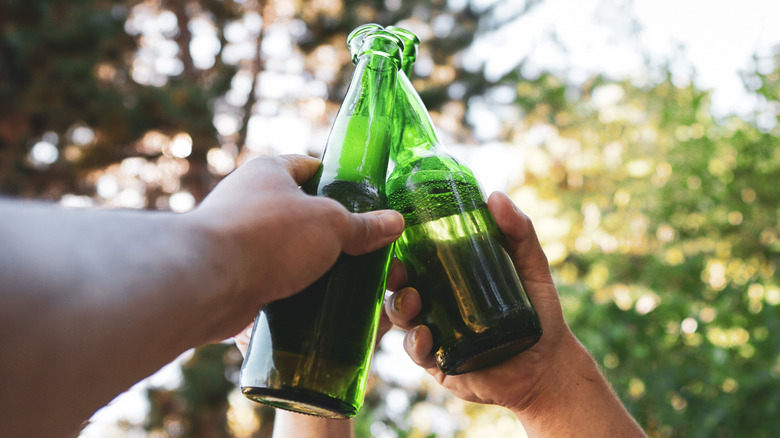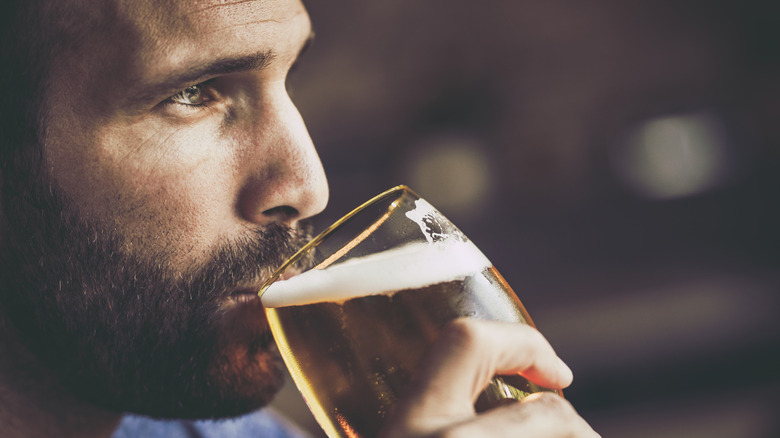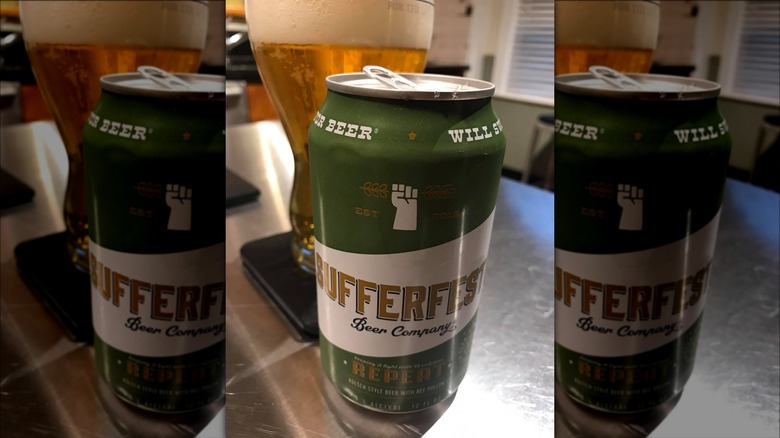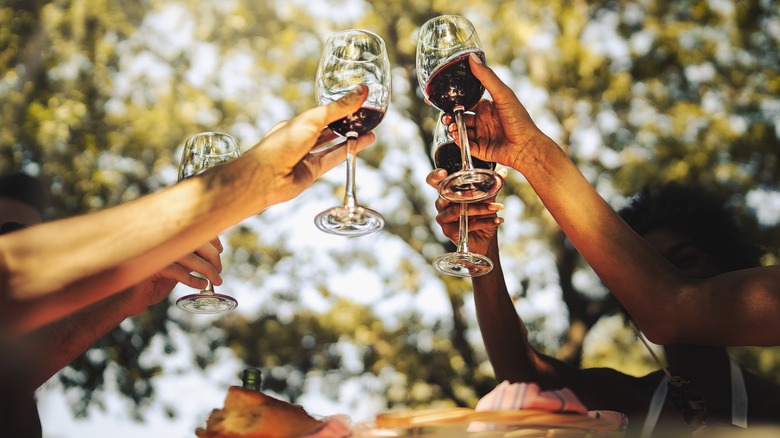A Post-Hike Beer Is Actually Good For Hydration
Going for a hike, like a stint in the gym or any other kind of intense physical activity, sure is thirsty work. This means that once you're done, you're going to need (and want) to rehydrate ASAP. Some hikers will go minimalist with water and others opt for an energy drink like Gatorade or even chocolate milk. If you're in the camp that equates post-hike downtime with Miller Time, though, it turns out you're not too far off-base.
Sure, beer may not be exactly a superfood in its own right, but it does have some health benefits. As Brad Schoenfeld, PhD writes in Men's Health, "Beer has carbohydrates and some sodium where water does not, which could be beneficial post-exercise." Beer also supplies some carbohydrates and can help replace depleted blood glycogen levels to a certain extent, which is also a concern after a long day on the trail (or a long hour of hiking on a treadmill).
Another nutrient found in beer is silicon, which is not to be confused with silicone. The latter is a man-made plasticky stuff, whereas the former is a substance that is found in the human body (amongst other places) and is necessary for maintaining strong bones and joints. Yet one more beer benefit is that the hops and malt provide polyphenols, which can help fight off any infections you might encounter along the trail should you accidentally step in a pile of ... never mind.
Post-exercise beer drinking does come with some caveats
Even though you could certainly do worse than a post-hike or workout beer, there's no reason to start drinking the stuff if you're not already a fan, nor to use this as an excuse to go overboard if you are. For one thing, you're advised to drink one or, at most, two beers, and preferably to consume them in addition to food. While it's possible that beer can give you the sensation of a full belly, it does not supply all of the necessary nutrients your body requires after a strenuous hike. Alcohol consumption could also negatively impact hormone levels and muscle development.
What's more (cue the disappointed groans), you should really only be drinking light beers, meaning ones with an ABV of 4% or less. Booze, after all, is not much of a performance enhancer, and it's especially important not to overdo it when you're on the hiking trail where overindulgence can result in any number of safety hazards. The alcohol in beer can also wind up dehydrating more than rehydrating once you have more than a few, so you'll also need to supplement your beer consumption with water or another non-alcoholic beverage. If you choose non-alcoholic beer, though, go ahead and indulge to your heart's content as it provides many of the same nutritional benefits without the detrimental effects of its more spirited (or spirituous) counterpart.
Some beers are made with rehydration in mind
If you really want that post-hike beer but want to maximize the rehydration benefits, there are now certain beers that seem to have been brewed with fitness in mind. These include Dogfish Head SeaQuench (a session sour), Harpoon Brewery Rec League (a hazy pale ale), and Sufferfest Repeat (a Kolsch). These beers contain additional nutrients such as potassium and sodium which are meant to help balance out your body's electrolytes. As sports nutrition expert Amy Goodson, R.D., C.S.S.D. tells Bicycling, "When your electrolytes are out of whack, cramping can occur." Sodium even offers another benefit as it helps your body to hold onto fluids and decreases your chance of becoming dehydrated.
So are these electrolyte-enhanced beers really better for your body than non-alcoholic post-workout drinks? The added sodium actually does seem to help, as well as the fact that such beers are often quite low in alcohol, around 2% to 3% ABV. One study published in the International Journal of Sport Nutrition and Exercise Metabolism (via PubMed) called such beers a "potential compromise" that would offer the drinker an opportunity to kick back with a (near) beer without suffering the dehydrating effect of a high-octane brew.
So can any other types of booze work for an apres-hike libation?
Okay, so we've established that, under certain circumstances, certain types of beers can be used in moderation after hiking or other strenuous activity. What can you do if beer's not your cup of, well, beer? While NYU exercise physiologist supervisor Heather Milton tells Wine Spectator that a glass of vino is not entirely out of the question, she does suggest that you only imbibe after you've rehydrated with water or a sports drink. Wine instead of water, while very symbolic in a Wedding at Cana kind of way, can slow the rate at which your muscles recuperate from a workout.
If you prefer something a bit harder than beer or wine for your post-hiking booze-up, some studies have shown that there may not be much of a link between alcohol consumption and decreased physical performance a day or two later. Even this data, however, cannot be interpreted to assign any particularly positive benefits to booze. What's more, Matthew Barnes, who lectures at New Zealand's Massey University School of Sport and Exercise, tells Vice that he feels alcohol does have a detrimental effect on the immune system and will stymie muscle recovery if consumed as a regular post-exercise thirst quencher.



